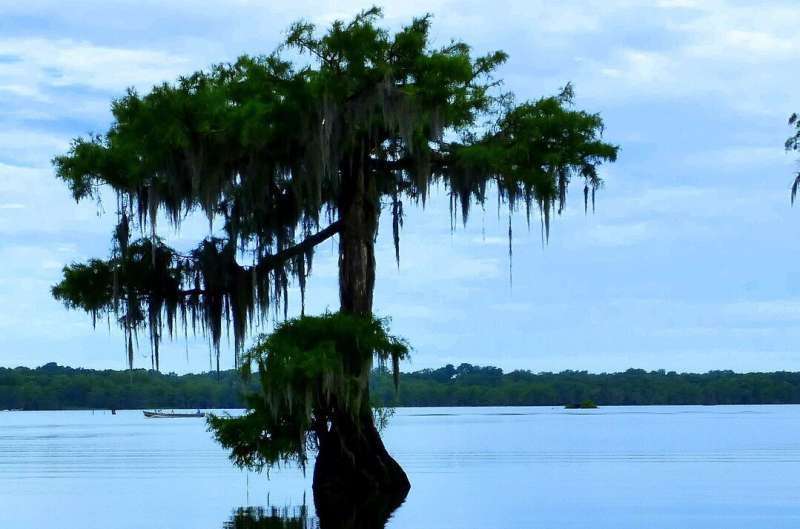This article has been reviewed according to Science X's editorial process and policies. Editors have highlighted the following attributes while ensuring the content's credibility:
fact-checked
peer-reviewed publication
trusted source
proofread
New 'time travel' study reveals future impact of climate change on coastal marshes

A new Tulane University study published in Nature Communications offers a glimpse into the possible impact of climate change on coastal wetlands 50 years or longer into the future.
Scientists are usually forced to rely on computer models to project the long-term effects of rising seas. But an unexpected set of circumstances enabled a real-world experiment along the U.S. Gulf Coast.
An extensive network of nearly 400 monitoring sites was established along the Louisiana coast after hurricanes Katrina and Rita. Then the rate of sea-level rise in the region surged to more than 10 millimeters (half an inch) per year—at least three times the global average. That exposed the region to the kind of ocean rise not expected until around 2070. The accelerated rise created a unique opportunity to determine whether the marshes can survive that pace of coastal flooding.
"It is the dream of every field researcher who does experiments—we can basically travel 50 years into the future to get a peek at what's in store," said Torbjörn Törnqvist, Vokes Geology Professor in the Tulane Department of Earth and Environmental Sciences.
The researchers used new techniques developed by European scientists to measure sea-level rise right off the coast with satellite data, something that was previously not available. The team then compared the rate of water-level rise at each monitoring site with the rate of wetland elevation change determined by other instruments and found that almost 90% of the sites were in deficit.
"To our knowledge, this is the first time that a climate impact experiment has been carried out over a region this large, based on hundreds of monitoring stations that have collected data for about 15 years," said Guandong Li, a Ph.D. candidate in Earth and Environmental Sciences at Tulane who led the study. "This has also allowed us to study the climate impact on a heavily human-influenced landscape, rather than a more resilient pristine ecosystem."
Li was investigating the role of land subsidence in coastal Louisiana when a team led by Sönke Dangendorf, the David and Jane Flowerree Professor in Tulane's Department of River-Coastal Science and Engineering, demonstrated the unprecedented rates of sea-level rise along the Gulf and Southeast U.S. coasts since 2010.
"Guandong immediately dropped everything he was working on to take advantage of this unique opportunity," Törnqvist said. "He set out to answer the key question of whether coastal marshes can keep up with this rate of sea-level rise, as some earlier modeling studies had suggested they can."
If the current climate scenario persists, the rate of sea-level rise by 2070 is expected to be about 7 millimeters (one quarter inch) per year. The study projects that approximately 75% of wetland sites will be in deficit by that time, potentially resulting in a rate of wetland loss much higher than what has already occurred in the past century.
However, the researchers emphasize that there is hope for a more favorable outcome if immediate action is taken. By meeting the targets set by the Paris Agreement and reducing carbon emissions, it is possible to shift to a more sustainable climate trajectory that would reduce the rate of wetland loss.
More information: Guandong Li et al, Real-world time-travel experiment shows ecosystem collapse due to anthropogenic climate change, Nature Communications (2024). DOI: 10.1038/s41467-024-45487-6. www.nature.com/articles/s41467-024-45487-6
Journal information: Nature Communications
Provided by Tulane University




















